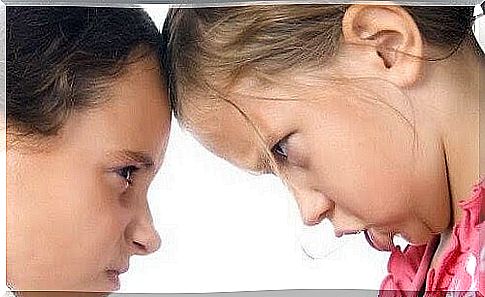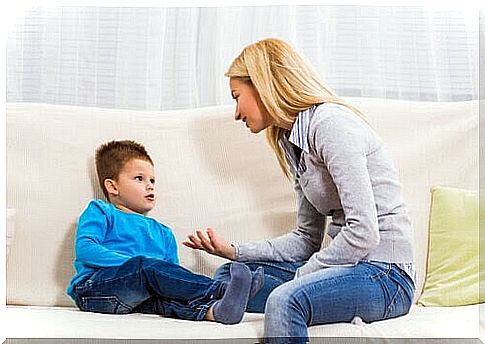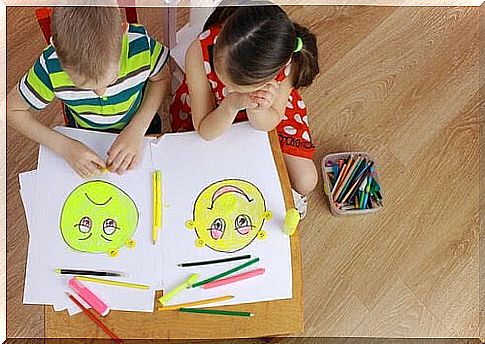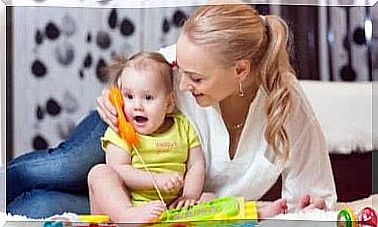How Do You Handle Conflicts Without Punishment?

It is not just children who are overwhelmed by their emotions. There will also be parents. So how do you deal with conflicts without punishment?
In sharp situations, parents can lose their temper and often end up punishing their children without realizing that it reinforces their children’s negative behavior.
To learn to handle conflicts without punishment, we must look at how learning cultivates emotional intelligence.
It is obvious that punishment has no long-term benefits for learning. This is because punishment does not change the causes of the inappropriate behavior.
Far from improving the situation, it actually generates negative feelings in the child towards the person imposing the punishment. Therefore, we need to learn other ways to show children how to better handle situations.
There are better ways than punishment
How do you do it? That’s the question. A good way is to work on two fronts at the same time. One is reflection and the other is intervention.
But before you do that, you have to cultivate your own patience, your empathy and your creativity. Raising your child requires you to take a step back and stay calm.
It will make a big difference if you can act calmly instead of overreacting and imposing a punishment on your children.

Manage conflicts without punishment
To learn how to handle conflicts without punishment, you must first determine if your child is really behaving badly. It is good to consider in what way their behavior is not good enough. You should then reflect on what caused that behavior and what is behind it.
Remember that there are often other underlying causes of children’s bad behavior. Often the child could have acted in a different way with more information and the ability to express that information.
When you are in the middle of the heat of battle that has created anger and aggression, it is best not to act under the influence of these emotions.
If the conflict is between two siblings – something that is very common – the first thing you should do is separate them and protect the attacked person from being injured.
The most important thing, however, is not to give more fuel to the fire and avoid aggravating the situation.
Stay calm
In the heat of the moment, the best thing you can do is just keep quiet and calm until the child calms down. You can hug him if he allows you to.
Try to calm him down in a few words, without trying to figure out who is to blame for what happened. When he is calm, you can start talking to him.
Only then can you, very calmly, ask your child to describe what happened. When he does, listen to him without correcting or judging him.
If they can not do so because they are still too young or because of language deficiencies, you can help him describe the facts, but always in a calm and conciliatory language.
The central point of the conversation should be that the child should be able to identify the emotions that led him or her to behave inadequately or violently, and what he or she felt after behaving in this way.
Acknowledging his feelings is important, as well as not inhibiting them. The idea is that you should teach him to identify his feelings and deal with them in a constructive way.
He should be told that it is normal to feel angry, but it is not okay to react by hitting another child, for example.

Controlling one’s emotions is an important skill
Teach him to recognize and validate his feelings. They are all part of our human nature, and to judge them as good or bad beds for shame and guilt and prevents them from being properly channeled.
You can also explain how you felt about their bad behavior. Use the right words and call all emotions by their proper names. I felt frustrated, upset, sad, for example.
Avoid saying things like “You made me feel”. When you say that you felt frustrated, you show that you take responsibility for your feelings and do not burden your child with them.
You can help him learn about empathy by taking everyday examples that connect him with a similar feeling. You can refer to movies, drawings, fairy tales or any event at school.
You need to remind him of the points you have discussed and of the need to talk about them again. Do this as many times as needed. And stay away from phrases like “How many times have I told you…”
Children need less punishment and more dialogue. Science has shown that our brains have great difficulty processing the word “no”.
It is much more likely that you will be heard when you structure your sentences positively instead of negatively.









